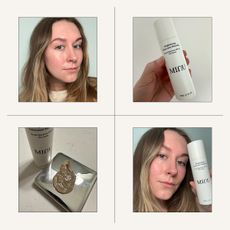Yes, Your Skin Will Change During Menopause—Here's Everything You Should Know
I am firmly against any skincare brand selling products to women in a way that encourages us to buy more. It's for this reason that when beauty brands started marketing certain products towards menopausal women, I felt somewhat uncomfortable. Why can't they just educate women on what they need rather than sell them more? I thought. But as more menopause skincare lines started launching, I saw more conversation about menopause open up. Women were talking openly online about their experience of menopause more than they ever had done before, and it felt momentous.
It's no secret that hormone changes affect our skin in a number of ways, and this is no more apparent than when female bodies experience menopause. With perimenopause typically starting between the ages of 45 and 55 (although, it's important to remember that this is just an average, as menopause can begin far sooner or later in life), bodily changes throughout the perimenopausal and menopausal transitions are absolutely normal (and to be expected)—particularly when it comes to skin. "We know that dryness, dullness, sensitivity, uneven skin tone, lines and wrinkles, and a lack of firmness are all key skin concerns that women experience during the menopause transition. These concerns are due to changes happening within the skin during this time, caused by fluctuating hormones and declining oestrogen levels," explains skincare expert and No7 science credentialing manager Eleanor Bradley.

This drop in oestrogen levels is the main cause for skin changes from the offset of perimenopause (the time at which periods begin to become irregular). "Collagen levels start to decline more quickly as oestrogen levels drop, meaning that skin can start to feel less firm and wrinkles can deepen. The biggest changes are arguably to the top layers of the skin though, including to the skin barrier. Changes here will have a bigger impact on skin’s resilience, radiance and how healthy the skin looks and feels. We know from our scientific research that declining oestrogen levels reduce the amount of lipids in the skin barrier, for example, which play a role in keeping skin supple, nourished and the skin barrier strong," adds Bradley.
In essence, this means that throughout the menopause transition and beyond, it's likely that skin will become more prone to wrinkles, redness, irritation and, believe it or not, sun sensitivity. Sadly, this means that, chances are, you're going to need to adjust your skincare routine somewhat. Products that once worked might not deliver the same results. Generally speaking, skin will require more hydration, more regimented sun cream application and products to target specific issues that tend to arise. So if you're at a loss with how to care for your skin throughout the menopause transition, keep scrolling for the best products to look for, depending on your concerns.
1. Fine Lines
A drop in plumping collagen during periomenopause and menopause can accelerate the rate at which skin ages, resulting in what may present as a fast onset of wrinkle formation and the deepening of fine lines. The best way to prevent this from happening and treating existing fine lines and wrinkles is through incorporating a retinol into your evening routine. Retinol can help boost the skin's natural collagen production and generally leave skin looking and feeling healthier. The catch? Skin can turn more sensitive throughout menopause, and retinol is infamously irritating, so be sure to start low and slow—look for formulas that contain low percentages, and start by applying once a week, slowly increasing as skin becomes more tolerant.
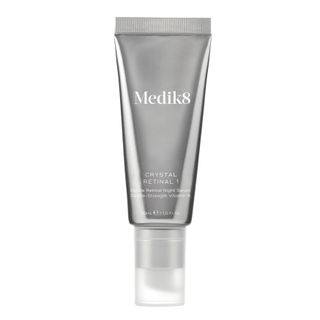
This serum is ideal for retinol newbies. Using a form of super-gentle retinal, it delivers the benefits of retinol without risk of intense irritation. Loved by dermatologists and beauty editors alike, this is easily one of the best introductory retinoid products on the market.
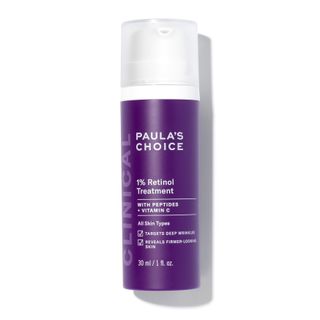
This stuff means business. Formulated with skin-smoothing retinol, glow-boosting vitamin C, and peptides to help plump skin deliver essential hydration, it's a real all-rounder that doesn't risk irritating skin as intensely as other formulas might.
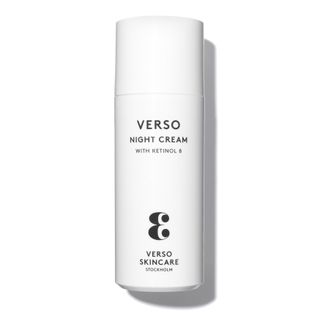
Skincare brand Verso uses an exclusive form of retinol (called Retinol 8) that is specially created to deliver the benefits of a high-strength retinol to stimulate collagen production with a small fraction of the irritation levels.
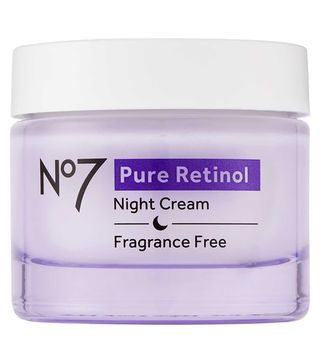
With pure retinol, this night cream delivers impressive results. Even better, it's also formulated with "retinol soothers" shea butter and bisabolol to keep skin hydrated and minimise risk of irritation.
2. Dryness
Any shift in hormone levels can wreak havoc with the skin's natural hydration levels. The drop in oestrogen that occurs throughout menopause can result in skin producing less of its naturally hydrating oils and therefore turning dry and lacklustre. It is absolutely essential to keep skin hydrated and well moisturised if you want to avoid further upset in the form of irritation, redness, and even menopausal breakouts.
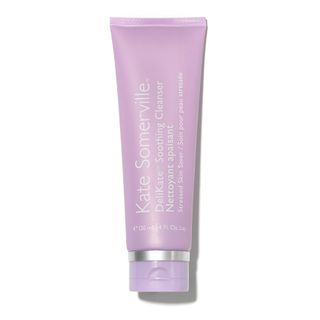
Removing makeup, dirt, and SPF from skin through cleansing twice a day is crucial for skin health. However, it is known to be a particularly drying step of any routine. This creamy cleanser is jam-packed with nourishing ceramides to keep skin happy and hydrated throughout the cleansing process.
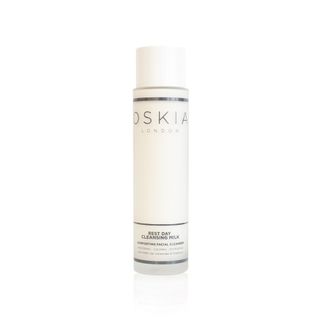
If your skin is prone to congestion, you might want to opt for a lightweight cleanser that doesn't leave skin with a noticeable film of moisture afterwards. This milky formula busts pore-clogging grime with ease and doesn't leave skin feeling stripped.
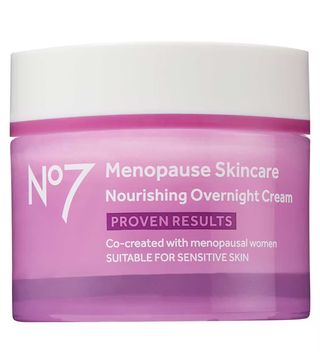
Specially formulated for menopausal skin, this night cream uses lipids, ceramides and hyaluronic acid to hydrate and soothe skin and leave your complexion glowing come morning.
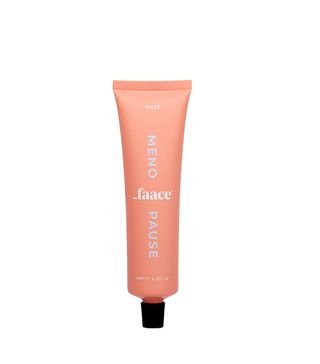
When your skin is feeling particularly stressed, this treatment mask contains a plethora of nourishing oils and vitamins to work in unison against common menopausal skin dryness.
3. Redness and Irritation
As mentioned, a drop in oestrogen production can cause all sorts of issues for the skin barrier. The skin barrier is your skin's natural defence mechanism that works to retain hydration and moisture in the skin, protecting it from external aggressors. When the skin barrier becomes weakened or compromised (as it commonly does throughout menopause) skin will be more susceptible to damage, redness, sensitivity and irritation (hence the importance of the hydrating products above). If you're experiencing any sort of skin sensitivity, look for targeted skin-barrier treatments to tackle your specific problem.
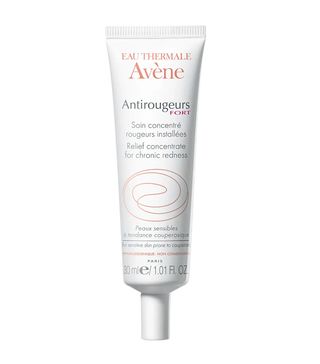
Specially formulated for sensitive skin that is prone to redness, this face cream will help to soothe itching, burning and discomfort by taking down inflammation and nourish the skin barrier at the same time.
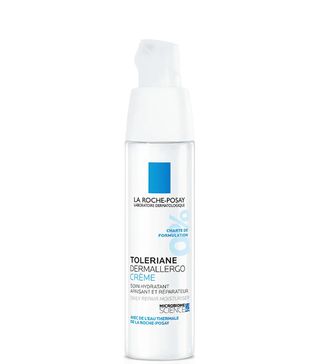
La Roche-Posay's Toleriane is widely considered the best sensitive skincare range around. This lightweight lotion is a barrier-loving delight in the long-term and a powerhouse for reducing sensitivity-induced discomfort in the short-term.
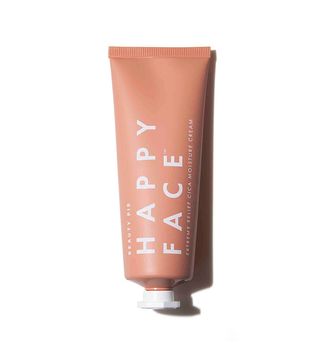
Price shown is members' price.
If you're looking for an everyday moisturiser that works as an all-rounder for dryness, sensitivity, redness, and irritation, this is it. With a gel-cream consistency, it contains cica and ceramides to help nourish the skin barrier and reduce irritation at the same time.
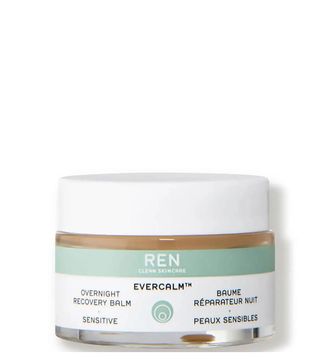
For times when your skin is particularly aggravated and dry, this overnight balm acts as the perfect barrier product. While it's not ideal for those with oily skin prone to congestion, if your skin barrier is crying out for some help, slather on a thin layer of this before you hit the hay, and let the soothing oils do the job of your skin barrier until it's fighting fit again.
4. Sun Sensitivity
As skin turns more fragile and prone to external aggressors throughout the menopause transition, it is absolutely imperative to remember this makes your skin more susceptible to sun damage. This means it is even more important that usual to keep up with daily sunscreen application throughout menopause—particularly if you want to avoid those accelerated signs of skin ageing and damage we discussed earlier.
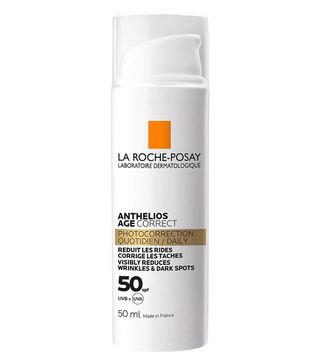
This rich SPF cream can easily double up as your day cream thanks to a concoction of skin-loving ingredients such as hydrating hyaluronic acid and barrier-loving niacinamide. Active ingredients help to tackle signs of premature skin ageing such as dark spots and fine lines, while broad-spectrum sun protection helps fend off further damage.
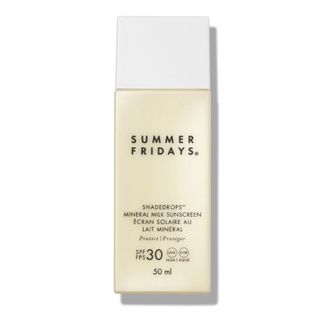
If you struggle to keep up with daily SPF application because you don't like the way the products feel on your skin, I highly recommend dipping your toe into the sun protection pool with this product. It's milky and hydrating but lightweight enough to feel basically undetectable on the skin. With SPF 30 protection, it's perfectly adequate from daily application in the cloudy UK climes, but by the time summer rolls around, you'll no doubt feel ready to dive in with a stronger SPF 50.
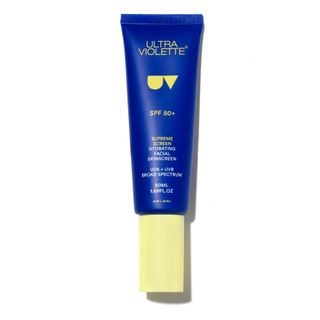
If your skin is feeling dry and looking lacklustre, this is the SPF to go for. It feels just like any other luxury moisturiser would, leaving skin looking healthy and glowing, but it guarantees top-tier sun protection while it's at it.
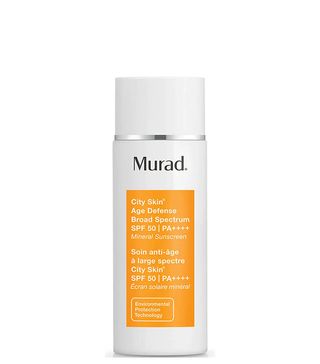
Because skin can be prone to sensitivity during menopause, it's a good idea to avoid any SPF products that could exacerbate irritation, meaning mineral formulas are likely best. This particular mineral option is impressively lightweight and doesn't leave a white cast over skin like so many others are known to do.
Next up, the five "anti-ageing" skincare truths that everyone needs to hear.
Shannon Lawlor is a renowned beauty journalist and has contributed to Who What Wear’s beauty content since 2020. As a leading beauty editor, expert and brand consultant, she has over eight years of experience working for some of the industry’s most esteemed titles, including Who What Wear (of course), Glamour UK, Stylist, Refinery29 and Fabulous. Having also worked behind the scenes with some of the industry’s biggest brands and retailers, Shannon has a unique insight into what people really want from their beauty routines. Understanding that beauty lovers seek honest, open and responsible advice, she has it made her mission to demystify the intimidating world of beauty, taking a no-frills approach to the most relatable topics. While Shannon is the first to admit she doesn’t hold the answer to every beauty question out there, she is dedicated to sharing her expert insights in a bid to help. As a self-proclaimed lazy girl, Shannon has an affinity for easy-to-use, foolproof beauty products and has made it her mission to scope out the best of the best. When she’s not working, Shannon is likely soaking in the bath or giving no-holds-barred beauty reviews on Instagram from her bathroom floor.
-
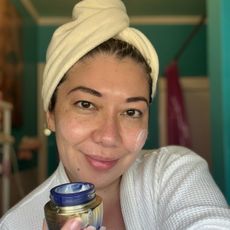 This Hero Japanese Skincare Ingredient Transformed My Dry, Perimenopausal Skin
This Hero Japanese Skincare Ingredient Transformed My Dry, Perimenopausal SkinI'm obsessed.
By Marie Lodi
-
 I'm 28, But My Neck Looks Way Older: I Asked 2 Derms What to Do About It
I'm 28, But My Neck Looks Way Older: I Asked 2 Derms What to Do About ItOperation "reverse-age my neck" has commenced.
By Kaitlyn McLintock
-
 An Expert Told Me This Cutting-Edge Molecule Is the Key to Visibly Youthful Skin
An Expert Told Me This Cutting-Edge Molecule Is the Key to Visibly Youthful SkinIt also gives you a serious glow.
By Shawna Hudson
-
 This Buzzy Noninvasive Treatment Can Smooth Fine Lines as Well as Botox
This Buzzy Noninvasive Treatment Can Smooth Fine Lines as Well as BotoxIt's definitely worth trying.
By Shawna Hudson
-
 I Just Turned 30—Here Are the Anti-Aging Products I Added Into My Beauty Routine
I Just Turned 30—Here Are the Anti-Aging Products I Added Into My Beauty RoutineI'm talking about at-home lasers, peels, and more.
By Valeriya Chupinina
-
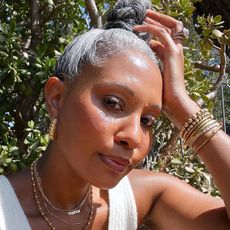 A Makeup Artist Says These 10 CC Creams Do the Most for Mature Skin
A Makeup Artist Says These 10 CC Creams Do the Most for Mature SkinYour skin will thank you.
By Maya Thomas
-
 14 Serums 40-Something Celebs Always Use (But Aren't Paid To)
14 Serums 40-Something Celebs Always Use (But Aren't Paid To)Serious sleuthing, here.
By Bianca Lambert
-
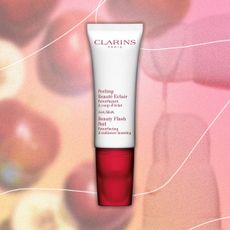 The New Face Mask Giving My Facialist a Run for Her Money
The New Face Mask Giving My Facialist a Run for Her MoneyPlus the other beauty products doing the most.
By Natalie Gray Herder

